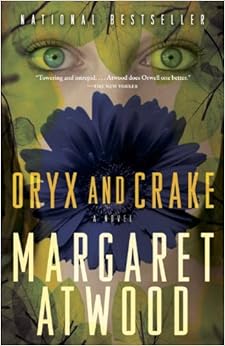 Throughout this book I get the sense that Margaret Atwood wrote Oryx and Crake as a means to rectify her own inner debates about the existential direction of humanity. Crake, Jimmy's close friend, is nearly a polar opposite of Jimmy in the way he sees the world. Crake sees humans, animals, plants; basically any living thing for the complex biological systems that they are composed of. In his view, these systems are imperfect and can be improved upon by the scientific advancements of the times. If he had his way, and he eventually does, people would act according to a strict framework laid out by the laws of nature. Jimmy, on the other hand, serves as Atwood's answer to the analytical thinking of Jimmy's time and, I suspect, of our time. Jimmy sees the world for its artistic beauty - its perfection in its imperfections. If this book were to qualify as a climate change novel, and I firmly believe it does not, it wold rely on its philosophical discussions of human nature. In that regard, there is a clear link to climate change as human nature is what got us in this mess in the first place. I believe Atwood is providing her take on the age old discussion of man's place in nature. Where do we fit as co-inhabitants of this planet? How does science, technology, art, religion (to some extent), etc., fit in our lives and how does that shape the direction of human civilization? I fear I will not be able to answer such questions in a brief blog post, but have found reading this book to be rewarding as it has forced me to open my mind to such questions.
Throughout this book I get the sense that Margaret Atwood wrote Oryx and Crake as a means to rectify her own inner debates about the existential direction of humanity. Crake, Jimmy's close friend, is nearly a polar opposite of Jimmy in the way he sees the world. Crake sees humans, animals, plants; basically any living thing for the complex biological systems that they are composed of. In his view, these systems are imperfect and can be improved upon by the scientific advancements of the times. If he had his way, and he eventually does, people would act according to a strict framework laid out by the laws of nature. Jimmy, on the other hand, serves as Atwood's answer to the analytical thinking of Jimmy's time and, I suspect, of our time. Jimmy sees the world for its artistic beauty - its perfection in its imperfections. If this book were to qualify as a climate change novel, and I firmly believe it does not, it wold rely on its philosophical discussions of human nature. In that regard, there is a clear link to climate change as human nature is what got us in this mess in the first place. I believe Atwood is providing her take on the age old discussion of man's place in nature. Where do we fit as co-inhabitants of this planet? How does science, technology, art, religion (to some extent), etc., fit in our lives and how does that shape the direction of human civilization? I fear I will not be able to answer such questions in a brief blog post, but have found reading this book to be rewarding as it has forced me to open my mind to such questions.But, yeah, this is definitely not a climate change book.

